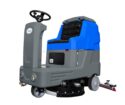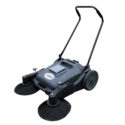Keeping floors clean is essential for maintaining hygiene, safety, and a polished appearance, whether in homes, offices, or industrial spaces. Floor cleaning machines are designed to make this task more efficient and effective, replacing traditional methods like mopping and sweeping. These machines come in various types, each suited for specific cleaning needs.
In this blog, we’ll explore the different names and categories of floor cleaning machines, their functions, and how to choose the right one.
Overview of Floor Cleaning Machines
Floor cleaning machines are mechanical devices used to remove dust, dirt, stains, and debris from different types of flooring surfaces. They range from simple manual tools to advanced automated machines that handle large-scale cleaning operations. These machines are widely used in:
- Homes: Vacuum cleaners, steam mops, and robotic cleaners.
- Offices and Commercial Spaces: Auto scrubbers, sweepers, and polishers.
- Industrial Settings: Heavy-duty sweepers, scrubber dryers, and high-power vacuum systems.
- Hospitals & Healthcare Facilities: Machines with sanitization features to maintain hygiene.
With advancements in technology, modern floor cleaning machines not only improve efficiency but also reduce labor costs and time spent on cleaning.
Types of Floor Cleaning Machines and Their Names
Floor cleaning machines are categorized based on their function, level of automation, and type of surface they clean. Here’s a breakdown of their different names and purposes:
A. Manual Floor Cleaning Machines
While automated machines dominate the market, manual tools are still widely used for smaller spaces and light cleaning tasks.
- Mops & Buckets – These are traditional floor cleaning tools that use water and detergent to clean floors manually.
- Manual Sweepers – Push-operated machines that collect dust and debris, ideal for small areas like patios, driveways, and sidewalks.
B. Automatic Floor Cleaning Machines
These machines are powered by electricity or batteries and are designed to handle larger cleaning tasks with minimal human effort.
1. Vacuum Cleaners
- Used for removing dust, dirt, and debris from floors and carpets.
- Available in upright, canister, backpack, and robotic models.
- Popular for home, office, and commercial use.
2. Scrubber Dryers (Auto Scrubbers)
- Also called floor scrubbers, they scrub and dry floors in one go.
- Ideal for large spaces like malls, airports, and warehouses.
- Available in walk-behind and ride-on versions.
3. Floor Sweepers
- Used for collecting dirt, dust, and debris from hard surfaces.
- Commonly used in parking lots, warehouses, and industrial spaces.
- Comes in manual, battery-operated, and ride-on models.
4. Polishers & Burnishers
- Also known as buffing machines, used for polishing and restoring shine to floors.
- Ideal for marble, tile, and hardwood surfaces.
- High-speed burnishers provide a glossy finish.
C. Specialized Floor Cleaning Machines
Some machines are designed for specific cleaning needs and surfaces.
1. Steam Cleaners
- Use high-temperature steam to disinfect and clean floors without chemicals.
- Suitable for tiled floors, carpets, and hardwood surfaces.
- Effective for removing bacteria, mold, and stubborn stains.
2. Carpet Extractors (Carpet Cleaners)
- Also called deep-cleaning carpet machines, they remove embedded dirt and stains.
- Use water, detergent, and suction to clean carpets thoroughly.
- Used in hotels, homes, and office spaces.
3. Robotic Floor Cleaners
- Autonomous machines that use AI to navigate and clean floors.
- Ideal for homes and offices with minimal human intervention.
- Popular models include Roomba and Roborock.
How to Choose the Right Floor Cleaning Machine?
Selecting the right floor cleaning machine depends on several factors:
1. Type of Flooring
- Tile & Marble: Auto scrubbers and steam cleaners work best.
- Carpeted Areas: Vacuum cleaners and carpet extractors are ideal.
- Hardwood & Laminate: Polishers and dry sweepers are recommended.
2. Size of the Area
- Small spaces (homes, small offices) → Robotic cleaners, vacuums.
- Medium spaces (retail stores, restaurants) → Scrubber dryers, sweepers.
- Large spaces (warehouses, malls) → Ride-on scrubbers and industrial sweepers.
3. Manual vs. Automatic
- Manual tools are budget-friendly but require more effort.
- Automatic machines save time and are efficient for commercial cleaning.
4. Water & Detergent Requirements
- Some machines use chemical-free steam cleaning.
- Others require special detergents for effective cleaning.
5. Cost & Maintenance
- High-end machines require an initial investment but last longer.
- Consider ease of maintenance and availability of spare parts.
Popular Brands of Floor Cleaning Machines
Several well-known brands manufacture high-quality floor cleaning machines:
- Tennant – Leading provider of industrial cleaning equipment.
- Karcher – Popular for residential and commercial cleaning machines.
- Nilfisk – Offers durable and high-performing floor cleaning solutions.
- Hoover – Known for vacuum cleaners and carpet washers.
- Bissell – Specializes in home and pet-friendly cleaning machines.
These brands are trusted for their innovation, durability, and efficiency in floor maintenance.
Conclusion
Floor cleaning machines play a crucial role in maintaining cleanliness across various settings. Whether you need a simple mop for your home or an industrial scrubber for a warehouse, there’s a machine designed for every cleaning requirement.
By understanding the different types of floor cleaning machines and their functions, you can make an informed decision that best suits your needs.
For commercial cleaning solutions, consider consulting professionals or investing in high-quality equipment to ensure long-lasting performance.
Frequently Asked Questions
1. What are floor cleaning machines called?
Floor cleaning machines go by different names depending on their function. Common types include:
- Vacuum Cleaners – For dust and dirt removal.
- Scrubber Dryers (Auto Scrubbers) – For deep cleaning and drying floors.
- Floor Sweepers – For collecting debris in large areas.
- Polishers & Burnishers – For buffing and shining floors.
- Steam Cleaners – For chemical-free sanitization.
- Carpet Extractors – For deep-cleaning carpets.
- Robotic Floor Cleaners – Autonomous machines for home and office cleaning.
- What is the difference between a floor scrubber and a floor polisher?
A floor scrubber is designed to clean floors by scrubbing dirt and grime, often with water and detergent, while a floor polisher is used to buff and shine floors, making them look glossy and well-maintained.
Scrubber dryers clean and dry simultaneously, whereas polishers primarily enhance the floor’s appearance.
3. Can I use a floor cleaning machine on all types of floors?
Not all floor cleaning machines are suitable for every surface. Here are recommendations:
- Tile & Marble Floors → Scrubber dryers, steam cleaners.
- Carpeted Areas → Vacuum cleaners, carpet extractors.
- Hardwood & Laminate → Polishers, dry sweepers.
- Concrete & Industrial Floors → Ride-on sweepers, heavy-duty scrubbers.
Always check manufacturer recommendations before using a machine on your flooring type.
4. What is the best floor cleaning machine for home use?
For home cleaning, the best machines depend on your needs:
- For dust and dirt → Vacuum cleaner.
- For deep cleaning & sanitization → Steam cleaner.
- For effortless cleaning → Robotic vacuum/mop.
- For carpeted homes → Carpet extractor.
If you have multiple floor types, a multi-surface cleaner is ideal.
5. How often should I use a floor cleaning machine?
- Daily: Vacuum cleaners (homes, offices), robotic cleaners.
- Weekly: Scrubber dryers (commercial spaces), steam cleaners.
- Monthly: Polishers (for shine and protection).
- As needed: Carpet extractors (for deep cleaning).
The frequency depends on foot traffic and the type of flooring.
6. Are robotic floor cleaners effective?
Yes, robotic floor cleaners are highly effective for light, daily cleaning in homes and offices. They:
✔ Automatically navigate and clean.
✔ Work on tile, hardwood, and low-pile carpets.
✔ Save time and effort.
However, they may not replace deep-cleaning machines like scrubbers or carpet extractors for stubborn dirt.
7. What is the difference between a ride-on and a walk-behind floor scrubber?
- Walk-behind scrubbers → Suitable for medium-sized areas, manually pushed.
- Ride-on scrubbers → Ideal for large spaces like malls and airports, allowing operators to sit and drive the machine.
Ride-on models cover more area quickly but are more expensive than walk-behind versions.
8. Do floor cleaning machines require special detergents?
Some machines, like scrubber dryers and carpet extractors, require specific low-foaming detergents to prevent damage. Others, like steam cleaners, use only water.
Using the wrong detergent can harm the machine and flooring, so always follow the manufacturer’s guidelines.
9. How do I maintain a floor cleaning machine?
To keep your machine in good condition:
✅ Clean the brushes & pads after each use.
✅ Empty and rinse tanks (for scrubbers & carpet extractors).
✅ Check filters & hoses for clogs.
✅ Charge batteries properly (for battery-operated models).
✅ Schedule servicing to extend lifespan.
Proper maintenance ensures efficiency and longevity.
10. Are industrial floor cleaning machines worth the investment?
Yes, for businesses with large spaces and heavy foot traffic, industrial floor cleaning machines are worth the investment because they:
✔ Save labor costs with faster, automated cleaning.
✔ Ensure consistent cleaning quality.
✔ Improve hygiene standards.
For small businesses or homes, manual or smaller automatic machines may be a more cost-effective choice.










